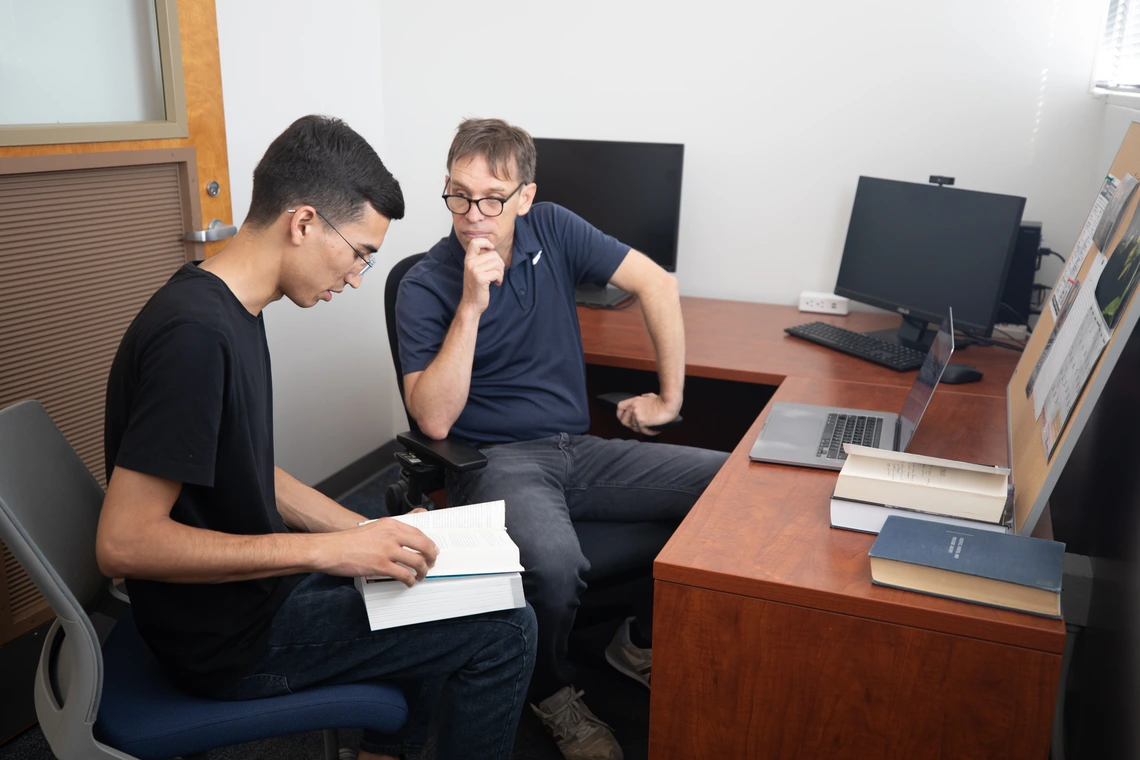Spotlight on Impact: Arizona Policy Lab Tackles Democracy, Justice, and Sustainability

Paul Schuler, associate director of the School of Government and Public Policy, with a student in the Arizona Policy Lab.
Mackenzie Virdee
Since 2021, the Arizona Policy Lab, housed in the School of Government and Public Policy in the College of Social and Behavioral Sciences, has served as a cross-disciplinary hub where University of Arizona researchers conduct evidence-based policy research. The lab’s research and experts have been featured in major media outlets such as The New York Times and publications like Scientific American, underscoring the impact and visibility of its work.
The lab partners with government agencies, nonprofit organizations, policymakers, officials and other practitioners to address urgent social and political challenges.
Its mission centers on four interconnected goals: producing cross-disciplinary, evidence-based research; building partnerships with government and nonprofit organizations; actively engaging with the community; and mentoring and training students. Together, these aims support the lab’s commitment to addressing complex public policy issues through collaboration, innovation and education.
The lab focuses on four key areas of expertise: American voting behavior; crime, policing and drug policy; energy and environment; and democracy and human rights. Each “cluster” encompasses specialized research topics, faculty-led projects, and roundtables.
Paul Schuler, associate director in the School of Government and Public Policy, emphasizes the lab’s role in applying faculty research to real-world challenges, with a focus on democracy, justice, and sustainability.
“An important goal of the Arizona Policy Lab is to communicate our faculty’s expertise on democratic institutions, criminal justice, and environmental sustainability to the community, students, and local government and non-governmental organizations,” Schuler said. “In the 2024/2025 academic year, we held five roundtable events attended by more than 300 community members, which focused on institutions critical to sustaining U.S. democracy.”
Past roundtable topics have included “The Politics of Misinformation – Perspectives from Industry and Academia,” “U.S. Policy Toward Asia, Europe, and Latin America in the Trump Era,” “Forecasting the Issues and Candidates That Will Define the 2024 Election,” “The Folly of Realism: How the West Deceived Itself About Russia and Betrayed the Ukraine,” and “U.S. Democracy Under Threat? Examining the 2024 Election in an Era of Global Democratic Backsliding” — a fall 2024 session that featured professors Suzanne Dovi, Paulette Kurzer, Paul Schuler, and Chad Westerland. They discussed concerns about U.S. democracy in a global context and whether the U.S. Supreme Court and the Constitution could serve as bulwarks against anti-democratic forces.
In addition to partnering with local and global organizations such as the Tucson Committee on Foreign Relations, the Arizona Democratic Resilience Network and the National Institute for Civil Discourse, the lab will also name three Melody Robidoux Policy Lab Fellows from School of Government and Public Policy faculty. These fellows will be provided with resources to launch initiatives focused on U.S. political institutions, democracy and human rights, and criminal justice.
“We will continue to hold public events on democratic institutions with national, local and government partners,” Schuler said. “In addition, we plan to deepen engagement with students, by holding student civics competitions. On criminal justice, we will also work with local law enforcement agencies to evaluate community engagement strategies to reduce crime. In sum, we excited about the opportunities for the AZ Policy Lab in the coming year to both evaluate policy innovations and increase comprehension in the community of the institutions critical to justice and democracy.”
##

